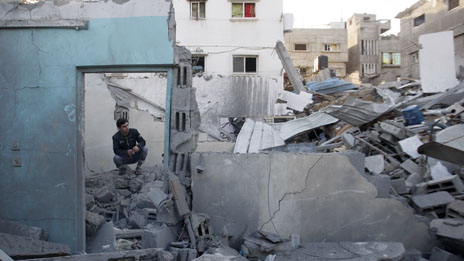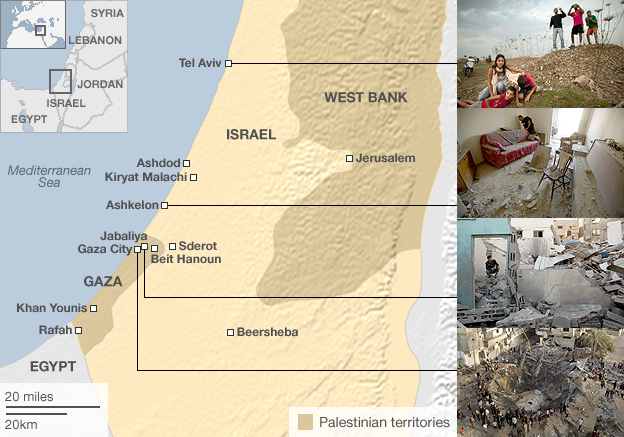Gaza crisis: Israel ground invasion plan 'on hold'
- Published
BBC's Jeremy Bowen: "Civilians on both sides need a ceasefire"
Israel has put plans for a ground operation in Gaza "on hold" to give talks to secure a truce with Hamas militants a chance, officials say.
It is understood Israel has set a Thursday deadline for the Egypt-brokered talks to succeed.
The conflict began last Wednesday when Israel killed a top Hamas military commander, saying it wanted to end rocket attacks on its soil.
More than 110 Palestinians and three Israelis have been killed so far.
Tuesday has seen a reduced level of violence, correspondents say, even though Israel has conducted some strikes - one was a "direct hit" on two militants in northern Gaza, the Israeli military said.
And rockets have been fired towards Israel - mainly targeting the south. However, two landed in an open area near Jerusalem, causing no injuries or damage.
Talk of war
Officials are due to restart talks in Cairo, and Egyptian officials have told the BBC there are signs of progress.
UN Secretary General Ban Ki-moon speaking in Cairo: "Families and children are dying as a result of senseless violence''
Israeli troops are massed along the border, raising fears of a ground offensive similar to that of 2008-09.
An Israeli spokesman told the BBC: "Israel wants talks to succeed but we're prepared to go into Gaza".
In a rare appearance, top Hamas military commander Mohammed Deif said Palestinians should prepare for a ground offensive, but warned: "The enemy will pay a heavy price if it thinks of entering Gaza."
US Secretary of State Hillary Clinton is due in Israel for crisis talks.
Mrs Clinton was going to underline that "the best way to solve this is through diplomacy, so that you have a peaceful settlement that ends that rocket fire and allows for a broader calm in the region", said Mr Obama's Deputy National Security Adviser, Ben Rhodes.
During the night, the Israeli military said it had carried out about 100 strikes mainly on smuggling tunnels and underground rocket-launching facilities. Hamas officials say seven people were killed.
A father and his two sons - thought to be two and four - were among those killed overnight, Hamas health ministry officials said.
More than 60 rockets have been fired from Gaza toward Israel so far on Tuesday - some managed to get through Israel's Iron Dome interception system, Israeli officials said.
A soldier was "moderately wounded" by shrapnel in Eshkol, southern Israel, the army said.
Regional risk
UN Secretary General Ban Ki-moon met Arab League Chief Nabil al-Arabi in Cairo on Tuesday, before heading for talks in Israel.
"I'm here to appeal personally for an end to the violence and to offer my ongoing efforts to achieve a ceasefire," Mr Ban told a joint news conference in Cairo.
Mr Ban warned against a ground operation in Gaza.
"Further escalating the situation will put the entire region at risk," he said.
Egypt has been trying to broker a ceasefire with the help of Qatar and Turkey.
Turkish Foreign Minister Ahmet Davutoglu and Arab foreign ministers are expected to visit Gaza on Tuesday.
The search for a ceasefire is now urgent
The UK urged both sides to stop attacks.
"There is no military solution to the conflict in Gaza," UK Foreign Secretary William Hague said.
The content of the Egyptian plan is not known, but both Israel and Hamas have presented conditions.
Israel's demands include no hostile fire of any kind from Gaza and international efforts to prevent Hamas from rearming, while Hamas is demanding an end to the blockade on Gaza and "Israel's assassinations".
Hamas seized control of Gaza in 2007, a year after winning a decisive victory in general elections. Israel withdrew from the strip in 2005 but maintains a blockade.
Israel, as well as the United States and the European Union, regards Hamas as a terrorist organisation.
Jabaliya refugee camp

A man surveys the rubble of a house in Jabaliya refugee camp



